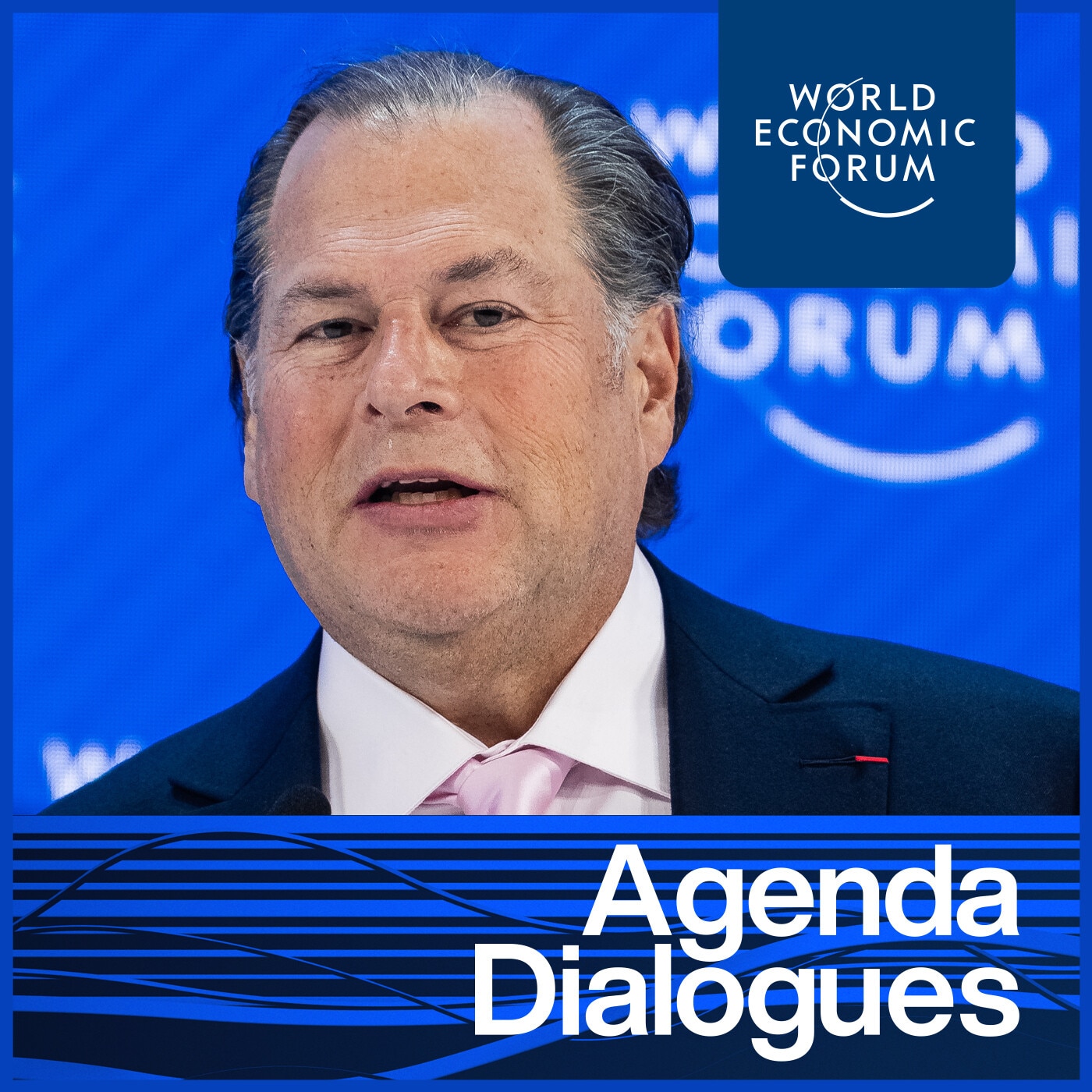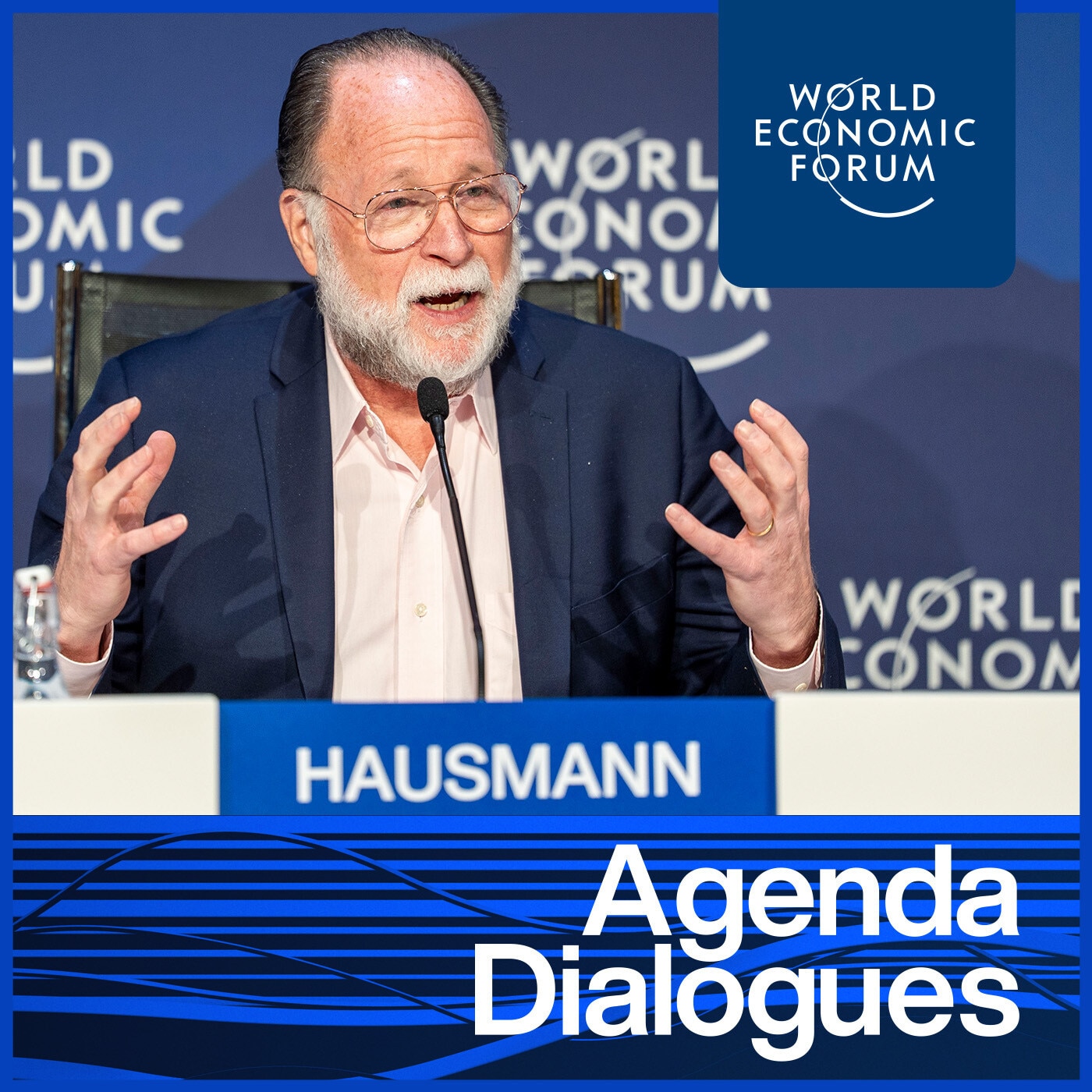Davos 2024: Facing a World without Antibiotics
ポッドキャスト・トランスクリプト
This transcript has been generated using speech recognition software and may contain errors. Please check its accuracy against the audio.
Shyam Bishen: Hi everyone, I just wanted to take a couple of minutes to welcome you to this very important discussion on antimicrobial resistance [AMR]. This is one of the key topics for us.
For those of you I haven't met, my name is Shyam Bishen and I head up the Centre for Health and Healthcare at the World Economic Forum. AMR is a key topic for us. Just recently a few months ago, we launched a global future council on AMR, which is co-chaired by Dame Sally Davies. She wanted to be here but unfortunately for some personal reasons, she couldn't be here. So she sends her regrets.
But this is a key area of focus for us because we know what AMR is doing to us as human beings. Every year, about 1.3 million people are killed from AMR. I'm talking about direct impact of AMR – 1.3 million deaths, so much higher than if you look at HIV, you look at TB [tuberculosis], you look at malaria. I think it's the third biggest disease killer after heart attack, stroke. So it's something that we need to take very seriously.
People have been working on it but we need more focus on this, we need more resources on this and that's why we are here today. Our platform, World Economic Forum, as you know is to bring public private sector together, as well as academia thought leaders, civil societies and you will see that mix of panellists here, you will hear much more and lot more from our distinguished panellists here today.
But I just wanted to take a couple of minutes to emphasize how important it is that we all work together on this. I said the number of 1.3 million people dying today. If we continue the way we are, it would be 10 million by 2050. Ten million lives lost that can be stopped, that can be prevented. Economic cost is also huge.
According to some estimates, the economic cost of AMR by 2050 could be up to 100 trillion dollars. It's trillion with a "t." So this is a huge economic cost as well. It's time we must do something about this. It's also good that United Nations General Assembly, there will be a high level meeting on AMR this year. So this is good to know that it's being prioritized.
Last week, I was in Rome, meeting with the health minister. Why Rome? Why Italian Health Minister? Because they have the G7 presidency. And I was very pleased to see that out of the three priority areas for G7 that humans and AMR was one of those. The other two are pandemic preparedness and digital health. So it is garnering a lot of focus, a lot of emphasis.
He also told me that the G7 finance ministers are working to create incentives for AMR research. The main problem is that you don't have enough resources going on R&D side because there is not enough push there is not enough pull. There are grants, loans and other things required.
There are philanthropic organizations, we see Wellcome Trust here, we have the Gates Foundation and others putting money into this but more needs to be done in terms of push. And for pull, governments have to come in, you need to come up with some advanced market commitments. You need to incentivize smaller companies, biotech companies, even pharma, big pharma companies to put more resources behind R&D, so that we can come up with some good drugs here.
So, as I said, you will hear much more from our distinguished panellists on this so without further delay here, I know we have a very limited time, I would like to hand over the discussion to our moderator Honourable, Right Honourable perhaps I should say, Helen Clark, ex-prime minister of New Zealand and Helen, over to you. You will introduce the panellists and we'll take it from there. Thank you.
Helen Clark: Thank you, Shyam. And I must commend the Forum on the marvellous name they gave the session. Perhaps you're all here because the title is Bad Bugs, No Drugs, more catchy isn't it than AMR.
That of course, is not to in any way undermine the critical issue that we're dealing with of antimicrobial resistance. And as Shyam said, it's a huge health challenge. I think the lay public would probably be astonished to learn that it's rated now as the third leading cause of death that makes it obviously appear extremely serious to us and the thought that the death toll could blow out 10 million people a year by 2050 is not good.
Now, of course, it affects everyone who needs access to effective antibiotics. But let me note, putting on a hat I have as chair of the Partnership for Maternal Newborn Child Health, that children are carrying a disproportionate burden of these deaths and AMR has the potential to roll back gains we've made in children's health.
There's also the particular exposure of women who are 27% more likely to receive an antibiotic prescription during their lifetime than men and that relates particularly to the sexual and reproductive health needs that women have. So the time for action, I guess was yesterday but we didn't act yesterday, we can act today.
As Shyam indicated, there's quite a lot on the WEF itself with the Global Future Council on the future of tackling AMR, which is proposing a grand bargain on how to deal with this. And then those major events – the second high level meeting at the UN this September and the opportunities around the G7 and and elsewhere. So we're in the spotlight room to put a spotlight on AMR issues and we're going to roll with our great panel here.
We're going to start off with just a broad question to the panellists. I have already been asked if they can talk across each other and I said, of course, in a civilized manner, befitting Davos but we're going to have a quick fire round to start with asking people to have two minutes each. Following from this that AMR is taking the global stage at the high-level meeting at the UN in September and other important stages.
So given these important events coming up, how do our panellists envision the collaborative efforts of the range of sectors human health, animal health, the environment, playing a pivotal role in addressing the challenges and what key priorities should guide our actions going forward. I'm going to start immediately to my left with Stella Kyriakides the EU commissioner for health and food safety. Over to you.
Stella Kyriakides: Thank you so much and good afternoon. It is indeed a great privilege to be part of this panel. And to be able to discuss a title which I remember when we were dealing with the COVID-19 pandemic. We often said at the time that we were also dealing with another silent pandemic being that of AMR.
And as the EU, we've been committed to tackling AMR for now for over 20 years through a "one health" approach, which is something that you have mentioned but I believe that firmly it's really time and we're all beginning to realize it that we need to turn this commitment into a reality by taking specific steps, both at EU level and of course at global level because it is a global problem. And I know that my initial intervention of two minutes, I just want to touch on two aspects of what we have been working with as an EU.
Since the pandemic, we have realized the importance of working for health at the EU level of building a strong European health union. And we have seen with the pandemic how we are stronger together when we're working in health. So what we have done specifically for AMR is in June 2023, we had council adoption of recommendations and guidelines to address AMR.
So, asking of the member states to have specific targets to address both the issues of antimicrobial consumption and to have targets with measurable goals that will allow us then to implement at the EU level and I can go into details of that. But at the same time, because we need to really address it by working at different levels, in the pharmaceutical reform that we put forward in April of last year, we put forward something that was mentioned about the push and pull mechanisms.
We have for the first time introduced the concept and the idea of having transferable exclusivity vouchers in order to address market failure and this is in order to encourage the development of new antimicrobials. And at the same time, we're working to encourage to our pharmaceutical reform, the prudent use of antimicrobials in terms of the misuse and the abuse.
And because it was mentioned and I will stop here of what we know about how citizens perceive AMR, I was quite surprised when I saw in the eurobarometer, that one in three European citizens have an antimicrobial prescribed to them almost every day.
So this is where we are now. And this is what we need to address and we need to deal with it. Because sometimes it's difficult to speak to the world about the concept of AMR and the title that we have in our panel today is more catchy but the reality is that AMR is on a daily basis impacting patients' lives, whether these are patients going through cancer, patients going through other diseases. This is the reality and we need to all work together globally and horizontally to actually turn our commitment into reality. Thank you.
Helen Clark: Thank you, Stella. Peter Sands, executive director of the Global Fund. Please come in.
Peter Sands: Right. I'll try and make four quick points. First, we have a problem in the AMR is a disastrous bit of branding. The public doesn't understand it and even within the global health community, there's ambiguity as to whether it's just about antibiotics or is it all forms of resistance because every pathogen becomes resistant.
And that ship may have sailed but I think if we can come up with sharper terminology that makes it easier for people to understand what we're talking about, that's really important because we will have to get the public involved, the public likes antibiotics.
Second, we have to acknowledge the global community is really bad at dealing with creeping problems; as you say, it's a kind of silent pandemic. We're much better at having a blazing fire and marshalling the fire engines. And this is the problem that by the time it becomes a blazing fire, it's going to be really, really, really dangerous.
So we need to use this high-level meeting – 24th – to have a kind of step change in the way we're dealing with that. But that will require us to do something that we're not good at, which is dealing with creeping silent problems. Third, please, please – the global health community is brilliant at creating new silos – can we avoid creating another new silo?
Can we find ways of tackling AMR using and leveraging connections to other things? And to give you one example, in fact, to compare TB deaths against AMR deaths is a false comparison because a third of AMR deaths are MDR TB [multi-drug resistant TB]; but also if you think about some of the things, the control of prescribing and all that kind of stuff, needs to be within the broader frame of prescription guidance.
The infection, prevention and control regimens are also incredibly important for a broader set of threats and dynamics. The disease surveillance we need to understand the evolution of AMR has to be within that broader frame. So it's not that we shouldn't be focused but we should integrate it with other things.
Last point, you talked about overuse – overuse is a huge problem both within animal health and within populations within rich countries. I don't think we should forget either, that for significant numbers of people in the world, getting access to antibiotics is a massive issue and we still have problems of basic fundamental access to antibiotics.
Helen Clark: Thank you, Peter. And we wait for your best branding experts to come up with a new term. We can't use bad bugs but what could we use? Coming next to Aleksandra Agatowska who's from a Polish company which is PZU Life.
Aleksandra Agatowska: Life. Yes, this is an insurance company. Thank you for having me here, it's an honour for me. In a nutshell, because I agree with you and I won't repeat it because it's not about that. We know AMR becomes the leading cause of death globally. We know that efficacy of empirical therapies declines enormously and we all know it. This is for me the knowledge.
On the second hand, it's not about not giving or prescribing antibiotics at all; as you said, it's about prescribing them wisely. And for me to do it wisely, we need higher awareness. And it's another thing to have knowledge on some kind of issues and other things to be aware of this. And I see that in terms of my perspective from working with different clients as their employers actually, we have a lot of impacts on big groups of people, their employees and I believe that employers should play a major role here to educate people they have access to.
And this education is for me, really important issue to have bigger awareness on the topic.
Helen Clark: Thank you. And last but not least, Severin Schwan, the chair of Roche.
Severin Schwan: Thank you. Yeah, perhaps I can make three points building off what I just heard. First of all, Peter, I really agree with you that it needs a holistic approach and what we see in general with healthcare is that it's very fragmented and it's certainly the case when it comes to infectious diseases and doing something about it.
It's really a long the whole patient journey starting with prevention, diagnosis – therapeutics are part of that but the healthcare system overall – if you don't have a healthcare function and healthcare system in the first place, there's nothing you can do about that. So I fully agree needs holistic approach where we all work together.
Now more specifically, in terms of pharmaceuticals, basically, there hasn't been a major advance over the last 50 years. So if you look at what has come out in the pharmaceutical industry, you can say basically nothing for the last 50 years. There have been some incremental approaches but no breakthrough relief.
And I'd say there is at least a perception we can discuss with its reality that there is no sustainable business model for this industry. So most companies have literally left that segment of the market. Roche, my company is one of the very few companies who are still active in this field and we have some potential early opportunities but by and large, the investments of the pharmaceutical industry into this segment is minimal, marginal if you look at the overall investments and what I hear is well this is an intrinsic problem.
There is just a problem. There cannot be a market, this is an example that the market doesn't work. That's what I hear from some people and the argument is: because with antibiotics, if you develop them, you should research them, so the number of patients who get them are very small and therefore by definition, there is no market. I think this is utter nonsense.
The market is working. There are just no signals to the players in the market to make a sustainable business. And I give you a very good example which I think is telling and that is orphan drugs. I remember when I started to work in the industry, there was a big discussion about orphan drugs, very seldom genetic drugs, etc. They are diseases where you have a couple of thousand patients perhaps in the world.
Now, with AMR what we heard it's the third biggest cause of death, so already, it's much more people than we have with orphan diseases and what happens with orphan diseases is that at some point there was a change in the thinking in society overall and built with regulators and policymakers and payers and societies are willing to pay very high prices for orphan drugs.
So there is a kind of, out of solidarity, people say well, if you are unfortunate enough to have a genetic disease, this society is prepared to pay a high amount of money on top of it; there were incentives for intellectual property, right, so that you have a longer exclusivity before generics come in. And as a result of it, the orphan industry, orphan drugs industry took off.
And today we have many, many, many medicines. There are still many diseases where we don't have a medicine yet but we have many, many diseases where we have companies who have made a real difference for those diseases. So what we need to incentivize the industry, there's no doubt for me, is not push incentives – in other words, R&D subsidies, no company is interested in this.
There is very important in the public setting for basic research for academic institutions but please all the policymakers out there and here in the room, and everybody, don't waste public money for R&D subsidies for private companies – complete waste of money. Put it into the public sector or public institutions in basic research because that is a timeframe which the private industry will not cover.
So R&D subsidies are a nonsense. Forget about push incentives for the pharmaceutical industry and I like to commend the European Commission because what you're doing now on a European level is you're looking at pull incentives. So you create a market and there are two ways how you can do it.
One is that you have a sustainable pricing. And the second one is that you give incentives on intellectual property and that is what is now at least conceptionally moving forward on a European level, it's much more difficult in small countries, right. So here, Europe and the US have critical mass to do that.
But beyond that, I would really call out for providing real signals to this industry that it's worthwhile to invest, otherwise, it will just not happen and it didn't happen over the last 50 years, let's face it but it's not a market failure. Actually, what we have is a market who is listening to the signals who are not coming.
Helen Clark: Yes, as you were speaking, it struck me it's hard to have a market failure when you have such a high level of use. So there's something else that's missing in the equation, which isn't getting the innovation and maybe we could drill in a little bit more on that.
Severin Schwan: One sentence on that. So, what you have is with antibiotics today – the market is what we call a generic market – so of the original antibiotics, by the way, Roche is one of those companies that developed original antibiotics, that business is all about– right, so today you have generic antibiotics and the generic antibiotics you get for cents, literally, it costs more than the chewing gum, literally, right?
So it's down to pure cost. And of course, if payers kind of take that as a reference for a new, innovative antibiotic, you can immediately see that it never ever will make sense.
If payers would look at this like an orphan drug and I think it is eventually an orphan drug even though we use so many antibiotics at the end of the day, the number of patients who get these late-line antibiotics, it's actually a relatively small market. So if we would have somehow a change in the thinking and not always look at it as a mass market, which it isn't, then I think we would potentially change the dynamics substantially.
Helen Clark: Alexandra, would you like to come in on that?
Aleksandra Agatowska: I think that insurance companies maybe not pay for direct consequences but indirect because we of course may do something within the product within insurance products. And of course, it's about risk because it's insurance and it's obvious.
But I believe that the structure of traditional insurance products should be changed in a little bit to not only taking the risk, which is right now possible but also to take into account some anticipation of not only risk but behaviour and to prevent them to have a product which are from the structure also educative a little bit.
I know that product, pay-as-you-live, are really hard to implement on the market because measuring is really hard. But I think that insurers are really strictly interested or should be strictly interested in a more issue. And yes, you're right.
However, we are not working directly, maybe in Poland, I didn't know about other markets. I think that this is completely different on other other markets but in Poland we do not work directly with hospitals etc. with doctors etc. We have some counter partners between us. However, as I said before we actually pay for it as a consequence of AMR and claims are getting higher and higher.
Helen Clark: Commissioner Stella, coming back to you. You told us a little bit about the strategy the EU's pursuing but you've also been the one on the panel who's very much raised the one health issues.
And I mean, my briefing tells me that 70% of antibiotic use is in the food chain and animal health, which really broadens what we're what we're talking about. So, really interested to hear a little from you about how the EU is addressing this broad spectrum issue, if I can put it that way.
Stella Kyriakides: Yes, I think that listening to all the other interventions as well makes us all understand how complicated this issue is and that we really need to all the time be addressing it at different levels and sometimes thinking out of the box. And this is what we have tried to do with the proposals we've put forward in our pharmaceutical reform as you have mentioned, in order to really incentivize the development of new antimicrobials.
Now, in terms of of the one health approach, this is the only way that I believe that we can move forward in tackling this problem. And in the council guidelines and recommendations that we have put forward and which went through council, so have been accepted by member states, we have put forward specific targets for example, decreasing by 50%, the antibiotics that are used in farm animals and in aquaculture so you need to really look at it in that horizontal way.
But it is not many of the member states have their national plans for putting targets for the prudent use of antimicrobials. What we've come and we're trying to do is putting these targets at EU level, EU recommended targets but then also having a way of evaluating our recommendation four years after its adoption.
So you need to be working at different levels all the time and bringing the member states together so that they feel that they're all working towards a common goal. And if I may just one word on education, I think that this is really vital that we address this because if you ask – I think it was again looking at the eurobarometer that almost 40% of people believe that viruses can be treated by antibiotics – I think some of the numbers I personally found quite revealing that we can solve infections caused by viruses by using antibiotics.
Possibly that's why one in three patients use at least one antimicrobial on a given day. So there are initiatives out there to raise awareness. We have a European Awareness Day on antibiotics every November – I think it's November 18th – together with WHO and this year, it's dedicated towards working towards the EU 2030 AMR targets.
So, it's a matter of bringing everything together over time and being able to work horizontally. I don't like using the term lessons learned from the pandemic. I feel that the pandemic has taught us a great deal but it's time that we moved on and actually applied a lot of what we have learned. But if we have learned anything is that we need to collaborate we cannot work in silos.
I agree so much with that. We need to look out and past ourselves. We need to look globally and G7 and G20 are already addressing this. And this is a problem that concerns us all. It's not only about industry, it's not about policymakers. We all need to be on this together. We need to be open-minded and listen and try and move forward because I think that we cannot afford to wait.
Helen Clark: Peter, you raised this term, "the silent creeping pandemic." Have you got any thoughts about how to jolt us out of complacency on this one and move forward?
Peter Sands: Well, one thing is we could talk a lot more about drug resistant TB. Because drug resistant TB is seriously nasty. Yeah, it's got a far higher fatality rate than COVID-19. About 600,000 people in the world are going to get it and only 40% of them are treated and the rest may be done. And the only thing that saved us from it being worse is that it's not nearly as transmissible as COVID-19 but we all know that these things aren't immutable, they can change.
And I think we do need, I'm afraid to say, we do need some aspects of the AMR problem that focus people's minds. And I think MDR TB could be quite helpful in that and it's something that we spent a lot of time on, we're basically the primary source of funding for diagnostics and treatment of MDR TB in the world.
In terms of the solutions, I mean, there's a lot of blocking and tackling basic stuff that can be done, as well as some of the harder stuff. There's really hard problems about creating new antibiotics and things like this but in much of the world basic things around prescribing guidelines, control of antibiotic distribution, infection prevention and control and health facilities, waste management.
These are and we're the largest provider of grants for health systems in low- and middle-income countries. We've really stepped up how much we're doing on some of these core basic building blocks because they underpin everything. They underpin the work we do on infectious diseases, they underpin all the surgical procedures, everything else but terminal health.
But at the moment, I'd say, where I'm conscious that we're scratching the surface. There's a huge amount to be done on all of this and we need to raise – I mean when you start talking about things like waste management, people's eyes glaze over but actually it's a really important part of this whole equation.
Helen Clark: Yes, recalling in the distant past my time as a minister of health, prescribing guidelines were really important. And you know our pharmaceutical system, of course had all the data and the practices that we're over prescribing for example on barbiturates we get a friendly knock on the door, to say we're a little bit concerned about the level of sleeping pills that are coming out here or antidepressants or whatever.
So I think how we can ensure that this is built into health systems around the world is really important.
Look, we have among us the minister of health of South Africa, the Honourable Mathume Joe Phaahla. Lovely to have you, Minister. You're a practitioner, you're trying to do this stuff. What would you like to say to the audience and our panel about how you in South Africa are addressing these range, this range of issues? Please feel free to stand up and give us your views on this.
Mathume Joe Phaahla: Well, thank you very much. Thank you very much to the facilitator and thank you very much to the panellists, indeed, very thought provoking contributions. Well, we go through difficulties as a government which must implement the provision of health services but at the same time, we must also regulate.
So, as the panellists have indicated and I think you, chairperson, we focus as a ministry of health largely on the human consumption of antibiotics, how to regulate, how to monitor and of course, we have to work with our counterparts in the agriculture area in the environment side.
We've made some progress on the clinical, human, you know, sort of monitoring and surveillance, not perfect, especially in our county where we also have a very strong, private healthcare providers. So on the public health's side, the clinical guidelines are there, we do try to monitor, not always easy.
But then, on the private side, you've got the primary health practitioners, your GPs and also your private hospitals. To get the data in terms of the monitor, the usage, very difficult because they also are very circumspect about providing information because they believe that if they compete against each other, so, if they were to give us all the information about what is the practice in one group and just as the other that would lay them, sort of vulnerable.
So, as you have said, that is just the one aspect, the human consumption, then you've got the animal side. Some bit of regulation there, very weak, in our case, fairly weak. There's a lot of animal consumption, which is over the counter which farmers can be able to attain, obtain without a veterinarian.
So those are the difficulty which we'll go through, but just listening to the panel here and of course, I'm also shocked at 1.3 million deaths already per annum, potentially going to 10 million, so what it says to me is that there's really a lot of agents, real agent and agency, as across the world in terms of the world.
I know this a regular topic at the World Health Assembly but in terms of how much member states actually will have taken, practical steps to get, I think that's another thing but I think national level, at regional levels and also at world bodies. What it says to me and of course, if you say that, from the pharma side, there is no incentive to really do a lot of further research to find new antibodies, it means we're staring serious trouble in the face.
So I think to me, the message is agency that as members, as individual states, regional parties, EU, ourself, there's the AU and all other regions, but also at the world stage, we really need to make sure and I'm happy that the UN will have a high-level meeting on this and I'm hoping that hopefully it will take us at the heads of state level to pay a lot more attention to this to be the key messages agents.
Helen Clark: And Minister, I'm conscious that next year South Africa I think is the president of the G20 and you have a health ministers stream so it may be a time to move it into the G20 health ministers discussion as well becuase I think the economic implications we haven't talked a lot about that they're huge.
The figures are huge, so that would be really encouraging to have your support.
Any quickfire questions from our audience or points? Yes, front row. Just introduce yourself quickly.
Audience member 2: My name is Ayman Tamer, a chairman of a healthcare company in Saudi Arabia, the Tamer Group. Very interesting panels. I learned a lot today. But what I've seen, whether raising awareness or having two to choose of antibiotics or whether we prescribe wisely or whether there is enough research in the last 50 years coming up with new pandemics and there's the prices from payers justify that.
I think there's one thing that maybe we didn't come to, I believe if we could have early diagnostics, instant diagnostics. You know, we live in a tropical country in Saudi Arabia, the use of antibiotics, naturally in a humid country, you give it to kids much more often, you're obliged to. For a while, it was the largest therapeutic class in Saudi. That's how big it was.
So, I think if we could have instant diagnostics, where before you take the wrong antibiotic for the wrong reason or you take it for killing a virus, as you said, or using the wrong antibiotic, I know they're all general but there are microbes that are different antibiotics, I think will help a lot the misuse, especially in our country and the way we pop antibiotics.
Helen Clark: Thank you for that now and I saw some more hands up over here.
Audience member 2: Hello, my name is Guilherme Rosso, I'm a global shaper from Brazil and head of innovation at the Little Prince hospital, the largest children's hospital in the country.
Helen Clark mentioned the impact on children so I would love to hear from the panellists more inputs on the impact of AMR on children and Minister, if possible, your perspectives on the challenges of AMR for the countries in the Global South.
Helen Clark: Right, so we've got a couple of questions. We've got five minutes to go and I'd like our panellists and their last minutes or so each, to respond to the questions if you wish, respond to any point you thought needed to be picked up all the way through and perhaps just half a word on what is your call to action to ensure that we do really get something moving on on AMR.
Can I start with you, Severin?
Severin Schwan: Yes. Again, I, from an industry point of view, I'd make the call for pool incentives, market incentives to incentivize the industry but let me say a word on the first question because I think the point you make is a really, really important one, building on what we heard from the commissioner that actually, there's an educational issue that people don't even know that a virus cannot be treated by antibiotics.
But beyond that, let's face it, in many countries in the world, that includes the member states in Europe, it's the doctors who are prescribing the antibiotics and they know it and so what one of the very practical suggestions I may make in this final call, really it would be so useful if there was an increase in diagnosis of infectious diseases.
Now, if I can just reflect from a company point of view, we are also active in diagnosis. There are only two markets in the world we have a diagnosis business for infectious diseases and this is the United States and Japan and that's it, right.
So, you can bet if the doctors would ask for a flu test to differentiate whether this is a cold, flu, COVID or really a bacterial infection. And these tests, they exist, right? We have now multiplex testing, which can differentiate it. I mean, this is really cheap diagnostics. This is really cheap. I mean, this pays off for you, at least in the longer term.
I think this alone would reduce the use of antibiotics in humans, it wouldn't resolve the issue of it in agriculture but in humans, pragmatically, there's just no doubt, it would be easy to implement, it would be cheap, actually and very effective to your point. We can do a lot of the basics here.
This is by ever, however, not a matter which can be regulated on the EU level, it will have to be regulated on the member states level. Also to be very clear, it's not your fault. I mean, it's so obvious, so obvious, you just wonder, I mean, are these people sleeping but what's happening here, right?
It's so obvious, what you're saying. It's so obvious and still it is not happening. I know Dame Sally who couldn't make it for today, I know she pushes like hell for that in the UK but in most countries we don't even speak about it. It's so obvious, so obvious. So thank you for that call.
Helen Clark: Commissioner Stella, your last call.
Stella Kyriakides: I don't take it personally.
Shyam Bishen: No, no, no. Really and again, congratulations to having that on the European level.
Stella Kyriakides: A great deal, of course, has been said and I just wanted to say that I think it's really important that we create the incentives, pull incentives to create new antimicrobials and when I spoke of education, raising awareness, I very much also meant the health care providers.I think that they need to be part of this and they're in fact part of what we have put forward in our pharmaceutical reform in terms of how we can educate them in very specific ways.
But you asked for sort of a call to action. And my call to action for this would be to keep this topic of AMR – whether we find a more friendly way of addressing it, I don't know, I think you're absolutely right – at the top of the political agenda, whether this is the EU political agenda, G7, G20, in meetings, conferences, this topic has to be there because this is really when we say the word silent pandemic.
It's maybe silent in terms of it's creeping up on us but it's very obviously there and impacting on people's lives. So that would be my call to action for us to use our voices in every single forum to keep this at the top of the political agenda. And as EU Health Commissioner, I would be willing to work in every single way out of silos to make sure that we tackle this.
Helen Clark: Peter, call to action?
Peter Sands: This is a global problem like climate change and it's not going to work if half the world gets on board and the other half doesn't. And the reality is that for the poorer countries in the world, this is not their highest priority and so there is going to be inequity and resourcing issue here. And we should, if we pretend that there isn't, it's not going to work.
Because if you're, I mean, Minister, you have enough challenges on your plate. And South Africa is one of the richest countries on the continent. So I don't think we can dodge the resourcing issue if we're serious about this. That has to be a funds flow to the poorer countries in the world to help them deal with it. Otherwise, we'll have a problem half solved.
Helen Clark: Alexandra, the last.
Aleksandra Agatowska: I believe that we really have these kind of platforms to discuss and to have all of the people on the board, not excluding any kind of part of the world as you said. And I believe that one half initiative for sure should be the platform to gather different counter partners.
And also I believe that political agenda is for sure very important to have it in mind. However, in the other side, I also think that what is the cost to think about it. Costs and for Poland case, for example, simple only working part of polls without children and I believe that costs of treatments onto children are even higher but cost for Poland on only working people is 10.3 million, billion excuse me, billion Polish zolty, gross of our GDP.
So, I believe that costs are really really enormous and this kind of information may help us do make it easier to get it on agenda of politics.
Helen Clark: Well, great panel and thank you, we have a full full room for the discussion. It's been quite fast and short but I think we all go away quite a lot better informed and knowing the complexity of it as well.
I think Peter put his finger on talking about – we need a better narrative really, because AMR resilience doesn't ring too many bells out there. And I thought your example Peter of the drug resistant TB that sort of sends shivers, doesn't it? So what about if many diseases had, that sort of brings it home?
And I think we've got a champion in Minister Joe for the G20 maybe to pick this up. So. Thank you, everybody.
Scroll down for full podcast transcript - click the ‘Show more’ arrow
Antimicrobial resistance is the third leading cause of death globally. While the global economy loses $36.9 billion a year as a result of super bugs, how can global economic policies continue to embed and accelerate action on urgent health security issues?
This is the full audio from a session at the World Economic Forum’s Annual Meeting 2024
Watch the session here: https://www.weforum.org/events/world-economic-forum-annual-meeting-2024/sessions/bad-bugs-no-drugs-facing-a-world-without-antibiotics/
This session is linked to the Pathogen Genomic Surveillance Initiative and the Global Future Council on Antimicrobial Resistance of the World Economic Forum.
Centre for Health and Healthcare
The Centre for Health and Healthcare is committed to improving global health outcomes by addressing trust issues, closing the gender gap in healthcare, and leveraging technology to transform healthcare systems. The Center is also working to improve health security through public-private collaboration.
Speakers:
Stella Kyriakides, Commissioner for Health and Food Safety, European Commission
Shyam Bishen, Head, Centre for Health and Healthcare; Member of the Executive Committee, World Economic Forum Geneva
Severin Schwan, Chairman, F. Hoffmann-La Roche Ltd
Peter Sands, Executive Director, The Global Fund to Fight Aids, Tuberculosis and Malaria
Mathume Joseph Phaahla, Minister of Health, Ministry of Health of South Africa
Helen E. Clark, Chair, Lancet Countdown High-Level Advisory Board on Health and Climate Change
Aleksandra Agatowska, Chief Executive Officer, PZU Życie, PZU Group
Catch up on all the action from Davos at wef.ch/wef24 and across social media using the hashtag #WEF24.
Related podcasts:
Check out all our podcasts on wef.ch/podcasts:
トピック:
ヘルスとヘルスケアその他のエピソード:
「フォーラム・ストーリー」ニュースレター ウィークリー
世界の課題を読み解くインサイトと分析を、毎週配信。
もっと知る ヘルスとヘルスケアすべて見る
Cynderella Carlynda “Cyndy” Galimpin
2026年2月11日










